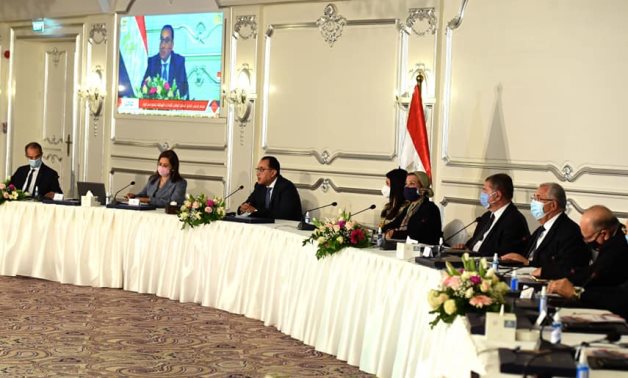
Prime Minister Mostafa Madbouli launching the 'National Program for Economic Restructural Reforms' in official ceremony on April 27, 2021. Press Photo
CAIRO – 28 April 2021: Prime Minister Mostafa Madbouli announced Tuesday launching the 'National Program for Economic Restructural Reforms' in a convention with strategic development partners, and a number of ministers, parliamentarians, members of industrial and trade unions as well as representatives of NGOs.
The program is the second phase of the National Program for Economic and Social Reforms, which will have a third phase. The prime minister explained that the first phase, which began in 2016, was focused on monetary and financial policies, noting it was a success as indicated by international institutions.
The second phase is concentrated on three sectors that are technology-intensive transformative industries, agriculture, and information and communications technology, he indicated.
As for the importance of that second phase targeting structural reforms in the abovementioned sectors, work systems, and governance at state institutions, the prime minister said it would accomplish sustainability in Egypt's economic growth and raise its rates.
Madbouli shed light on the partial success of the monetary and fiscal reforms carried out in 1991 but was of no avail for they were not followed by structural ones.
Unlike the first phase which was demand-oriented, the second phase remedies aggregate supply by tackling seven areas that include reforming the economy's structure, freeing trade, reforming the vocational training system, and developing financial markets.
Madbouli highlighted certain figures saying that the real GDP growth recorded 5.6 percent in FY2018/2019 up from 2.9 percent in FY2013/2014; inflation dropped to 4.3 percent in September 2019 down from 34.2 percent in July 2017; unemployment fell to 7.5 percent in the second quarter of 2019 against 12.4 percent in the second quarter of 2016; foreign reserves grew by 8.1 percent to become $45 billion in FY2018/2019 instead of an 11.4-percent growth in FY2014/2015; and, poverty rate declined for the first time in FY2019/2020 hitting 29.7 percent compared to 32.5 percent in FY2017/2018.
According to the estimations of the International Monetary Fund (IMF) in 2020, the Egyptian economy is one of the fastest growing ones in the world with 3.6 percent, and the second largest in the Arab World with an average GDP worth $360 billion per annum. The prime minister noted that in spite of COVID-19 repercussions, Egypt was among 16 countries that achieved economic growth exceeding one percent in a time where only 11 countries grew by 0-1 percent while the other 167 countries endured contraction.
The prime minister stated that Egypt targets raising annual economic growth to 6-7 percent during the coming three fiscal years underscoring that the ICT sector's share in the GDP rose to five percent up from 2.7-2.8 percent. In addition, the share of transformative industries became 15 percent instead of 12.5 percent. Also, the contribution of agriculture has grown. Madbouli said that there is a target to turn the $8-5-billion deficit in the balance of payment (BOP) into a $3.5-billion surplus in the coming period.
Before COVID-19 outbreak, Egypt achieved a primary surplus of two percent and there is a goal to achieve a rebound as a first step within a plan to reduce the total deficit to 5.5 percent by FY2023/2024. That plan includes stabilizing debt in the upcoming fiscal year that begins on July 1 and ends on June 30, 2022, and reducing it in the following two years.
The systems to be subject to structural reforms are those of legislations so they would be unified and simplified; governmental performance through digitalization; logistics and transportation; business ecosystem; financing; and, improvement of the demographics' characteristics by providing adequate healthcare, education, and social safety. Furthermore, there will be more emphasis on promoting green economy and raising the local component in products manufactured in Egypt.
The most prominent social safety program embarked on by the state is "Decent Life" Project to be executed over the next three years having as beneficiaries 58 percent of the Egyptian population, and the entire rural community. What has been achieved since its launching in 2019 can be considered a pilot phase but the real start will be in FY2021/2022.
It will be carried out in 4,658 villages inhabited by 58 million people, and its cost has been set at LE500 billion but is expected to become LE600 billion during execution.
Further investments will be injected in the monetary subsidies program, Takaful Wa Karama (Solidarity and Dignity), expanding its umbrella, among other social safety programs. Other investments will also be allocated to pension funds.
Comments
Leave a Comment